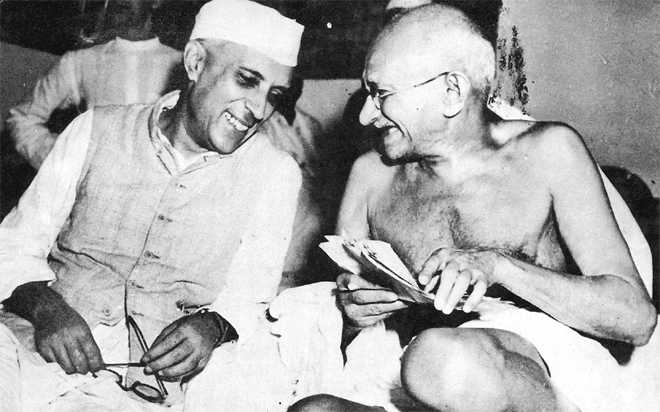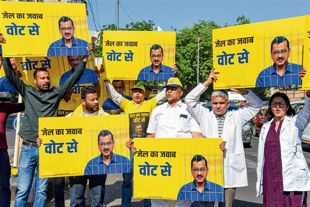
A lesson of the freedom struggle: The merger of ''modernist'' Nehru and ''spiritual'' Gandhi.
Avijit Pathak Professor of Sociology, JNU
Avijit Pathak
Professor of Sociology, JNU
Falling for someone's smiles,
Borrow, if you can, someone's strife,
Open your heart for someone's love,
This is the pleasure of life...
— From Raj Kapoor's 'Anari'
Even at the moment of celebration, a nation needs to look at itself — not just its success stories, but also its failures, contradictions and paradoxes. The art of a reflexive quest is important, particularly at a time when the culture of narcissism tends to reproduce itself through media simulations, self-advertisement and a fairly developed propaganda machinery. Moreover, if an anti-dialogic political milieu sees every act of dissent as a conspiracy and thereby generates fear amongst citizens, the danger becomes acute. Yet, as history reveals, it is only through perpetual critical enquiry that we can truly serve the nation.
Well, it is not a bad idea to celebrate the Independence Day. Because in this celebration lies a sense of gratitude for those who loved and dreamed, sacrificed their little comforts, fought the mighty British empire, and imagined the possibility of freedom. It is also our collective gratitude for innumerable unknown heroes, or what subaltern historians would have regarded as the 'voices from below'.
Furthermore, the moment of festivity or celebration, as cultural anthropologists argue, reinforces some sort of group solidarity; and this secular ritual is essentially a form of 'civic religiosity' a modern nation needs to define itself.
Grand visions, enchanting ideals
However, as mature citizens we need to see beyond the rites and rituals — hoisting the National Flag at the historic Red Fort, Prime Minister's speech, and dissemination of 'patriotic' songs through radio and TV channels. Take, for instance, the ideals that guided Mahatma Gandhi to write Hind Swaraj. To begin with, Gandhi saw the violence of 'brute force' in colonialism; and 'swaraj', for him, was not to defeat the colonial West at its own game; instead, he sought to alter the grammar of the game itself through 'soul force' — the cultivated art of satyagraha endowed with such qualities as self-purification, non-possessiveness and the art of dying.
Furthermore, his emphasis on austerity was not an exercise in self-denial. Instead, Gandhi wanted to make us see the distinction between genuine organic needs and greed or insatiable desire. A life based on greed is inherently violent; and it is against the ethos of cosmic and ecological connectedness. When for the fulfillment of artificial needs we keep destroying nature and evolve an instrumental orientation to fellow citizens, we prepare the ground for a violent, asymmetrical and non-sustainable development. In other words, for Gandhi, freedom didn't mean merely the political freedom from the British rule; it aimed at creating a new nation filled with the spirit of harmony, non-violence, decentralisation and relatively autonomous and empowered local communities.
At this juncture, I wish to invoke Nehru — particularly, his Discovery of India. Possibly, Nehru's affinity with enlightenment, modernity and its gospel of urban and industrial mode of living made him somewhat different from Gandhi — his 'gentle anarchy', his religiosity, his ambiguity towards machinery, or his engagement with the likes of Ruskin, Thoureau and Tolstoy. However, Nehru's non-sectarian orientation, I assume, brought him closer to Gandhi. In his Discovery, 'western' Nehru — like a true wanderer — sought to understand the rhythm of an ancient civilisation, and at the same time, wanted to overcome the 'dead weight of past'. He saw the spirit of pluralism and splendid diversity in the fabric of the Indian civilisation. Like Gandhi, Nehru too understood that if Hinduism, despite its immense contributions to the making of Indian civilisation through its epics, Puranic tales, philosophic traditions, cultural festivities and the continual practice of pilgrimage, becomes hegemonic, India would lose its oceanic character, its elasticity and openness, or its cosmopolitanism.
No wonder, despite differences, Gandhi trusted Nehru when communalism, religious violence and Partition were inflinching a grievous injury to our collective consciousness. A great lesson of the freedom struggle was this point of merger: 'modernist' Nehru and 'spiritual' Gandhi walking together.
Instrumental politics & fall from grace
It is for historians and political theorists to make sense of the curved trajectory the post-colonial Indian society has passed through — the assassination of Gandhi by a Hindu fanatic, the achievements and failures of Nehruvian mixed economy, the rise of Indira Gandhi and the making of an authoritarian personality, the fragmentation of the polity with the assertion of lower caste movements and regional forces, the era of coalition politics, the neo-liberal turning point, and the rise of cultural nationalism.
Here, let us concentrate on the two disturbing features implicit in the present state of affairs. First, we see the assertion of militant Hindutva — an ideology not in tune with Gandhi's 'sanatani Hinduism' or cross-religious dialogue. It abhors Nehru's cosmopolitanism. The result is the normalisation of violence and intolerance in the name of religion. Be it lynching or cow vigilantism — it is a symptom of this shift: from what Tagore would have regarded as an 'oceanic civilisation' to a 'Hindu rashtra' that is perpetually insecure of the presence of the other.
Second, as it mixes religious fundamentalism with neo-liberal consumerism, 'brute force' becomes the new language of the political establishment. From bullet trains to smart cities, from malls to private universities; everything, be it a tree, a river, a tribal habitat, a skill, has to be conquered, marketised and manipulated. Violence becomes the subtext of 'progress'. Gandhi's 'soul force' finds no space in the changing cultural landscape.
Is a better society possible?
The political class with its shameless opportunism does not arouse hope. Again, not much can be expected from people like us — the new middle class in India. As we become intoxicated consumers, finding our 'essence' in the material/symbolic products the 'hidden persuaders' seduce us to buy, seeing ourselves as the 'EMI generation', becoming well-fed/well-clothed employees of gigantic corporations, and finding enlightenment in the post-truth industry of social media, it is difficult to be inspired by the likes of Bhagat Singh or Gandhi. Are we then creating the ground for the rise of the authoritarian personality? Think of it even when the celebration goes on.



























